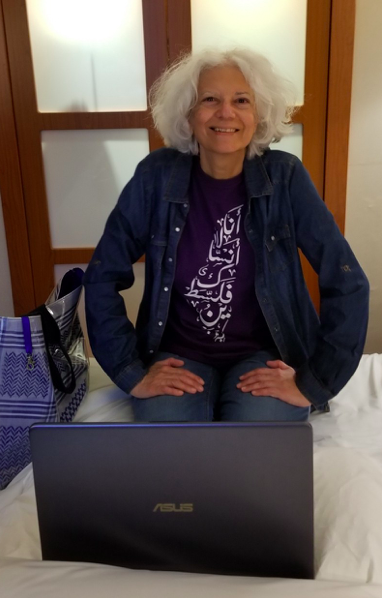Masar Badil Means Standing Strong. Understanding that the Only Recourse for Palestinians Is Continued Revolt.

All Global Research articles can be read in 51 languages by activating the “Translate Website” drop down menu on the top banner of our home page (Desktop version).
To receive Global Research’s Daily Newsletter (selected articles), click here.
Visit and follow us on Instagram at @crg_globalresearch.
***
Stand strong, not only with Palestinian civil society, but with all forms of legitimate resistance to Israel’s domination, control and oppression in Palestine from the river to the sea.
That’s the powerful message I am anticipating to hear tomorrow at Masar Badil, Conference of the Alternative Palestinian Path: Towards a new revolutionary commitment, here in Madrid (Oct 30, 2021).
Madrid! No Palestinian can hear the name of this wonderful European city without thinking of the ill-fated Madrid Conference of 1991, which dragged on until August 1993 without any progress, when Israel and the PLO entered into negotiations in Oslo with Norwegian mediation, in the utmost secrecy. The Palestinian delegation at the Madrid negotiations, led by Haidar Abdel Shafi (Haydar Abd al-Shafi), found out about the talks from a radio announcement.
Fifty percent of Palestinians today were born after what came to be known as the Oslo Accords. This younger generation of Palestinians, especially those within the West Bank, like the younger generation of Israeli Jews, is only now awakening to the reality of the disinformation in which they grew up believing. I see Masar Badil as the first step in the re-education of this generation of Palestinians and Israelis alike.
It is sometimes argued that the failure of the “peace process,” a euphemism for the Oslo Accords that is anything but, is due to issues of identity and how “both sides construct the National narratives.” In this argument, the Palestinian National identity emerged only as a response to the threat of Zionism in the early 20th century and was confined at the time to the educated elite. Historian Walid Khalidi described its rise as follows: “If the Arab population of Palestine had not yet been sure of their identity before 1948, the experience of defeat, dispossession, and exile guaranteed that they knew what their identity was very soon afterwards. They were Palestinians.”
The so-called Arab revolt of 1936–1939 against the British was a Palestinian revolt. In the face of continued defeat and exile, Masar Badil understands that the only recourse for Palestinians, then as now, is continued revolt.
The first objective of the alternative path envisioned by the Conference states:
Asserting the Palestinian, Arab and international popular response to the path of Madrid and Oslo, the declaration of the failure of this catastrophic road, from the heart of Madrid, Spain, in October 2021, and renewing the rejection by the supporters of Palestine everywhere in the world of all agreements and treaties that undermine the rights of the Palestinian people, from the colonial “Balfour Declaration” to the last negotiations that the Palestinian Authority may have concluded with the Zionist state. We consider all of them null and void, illegitimate and unlawful. Accordingly, Palestinian, Arab and international popular participation is critical to achieve the democratic, popular content of the conference and its outcomes. Participation in preparing for the conference and ensuring its results are individual and collective responsibilities.
Much of what activist groups on social media, including some Jewish groups, have long been doing and continue to do, is to expose the Israeli Zionist National identity narrative for what it is: a settler-colonial, apartheid, Jewish supremacist identity that robs Palestinians, not only of their land, but also of their own national identity on that homeland.
At a time when Israel is orchestrating a smear campaign to discredit and de-legitimize Palestinian essential human rights work by equating it to terrorist acts, it is more important than ever not to allow Israel and its allied disinformation groups, as Shawan Jabarin put it in a recent opinion piece in the EU Observer “to shatter the trust and confidence at the basis of the European-Palestinian relationship, and entrench its domination on the ground by taking effective control and assuming oversight over European funding to the Palestinian civil society. In doing so, Israel and its allied disinformation groups not only ensure the actual shrinking of the Palestinian civil space, but also that of the European civil society, its values and its human rights legacy.”
One thing Masar Badil will be looking into is how to bypass the Palestinian dependence on financing by the EU and member states.
*
Note to readers: Please click the share buttons above or below. Follow us on Instagram, @crg_globalresearch. Forward this article to your email lists. Crosspost on your blog site, internet forums. etc.
Rima Najjar is a Palestinian whose father’s side of the family comes from the forcibly depopulated village of Lifta on the western outskirts of Jerusalem and whose mother’s side of the family is from Ijzim, south of Haifa. She is an activist, researcher and retired professor of English literature, Al-Quds University, occupied West Bank.
She is a frequent contributor to Global Research.
Featured image: Rima Najjar in Madrid blogging on Masar Badil, Conference of the Alternative Palestinian Path: Towards a new revolutionary commitment

